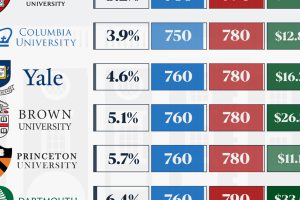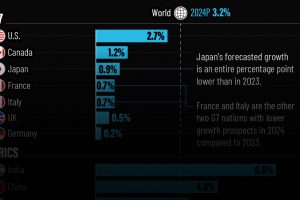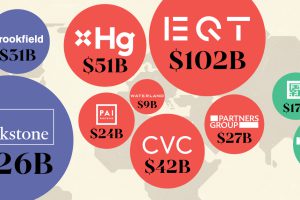All movements start with rebellion, and the craft beer revolution is no different.
Born from the frustration of mass-produced beer made from cheap ingredients, entrepreneurs went head-to-head with global brewery giants to showcase local and independent craftsmanship.
Suddenly, drinking beer became less about the alcoholic content and more about the quality and experience. Craft beer allowed for constantly changing flavors, recipes, and stories. With sales accounting for 24% of U.S. beer market worth over $114 billion, the global craft beer movement has been historic.
Which States Bring Home the Beer?
Today’s map from C+R research demonstrates the growth of the craft beer market, by ranking the U.S. states based on craft breweries per capita.

The data for this visualization comes from The Brewers Association—an American trade group of over 7,200 craft brewers, suppliers, and distributors, as well as the Alcohol and Tobacco Tax and Trade Bureau.
According to the data, Vermont has emerged as the craft beer capital of the U.S. with 11.5 breweries per 100,000 people. That’s equal to 151 pints of beer produced per drinking-age adult. Following closely behind are Montana and Maine, each with 9.6 breweries per capita.
You’ll notice that in Southern states such as Alabama, Georgia, and Mississippi, that there are only 0-0.9 breweries per capita. This is actually because of tighter liquor laws—for example, only 10 years ago, it was illegal to sell specialty beer in South Carolina that contained more alcohol content than a typical Budweiser.
Becoming a Brewery Nation
In 2008, there were only 1,574 breweries across the United States.
However, as you can see in the below data from the Brewers Association, the total amount of craft breweries, microbreweries, and brewpubs has climbed to 7,346 in just a decade.
| 2014 | 2015 | 2016 | 2017 | 2018 | Change (’17-’18) | |
|---|---|---|---|---|---|---|
| Regional Craft | 135 | 178 | 186 | 202 | 230 | 13.9% |
| Microbreweries | 2,076 | 2,626 | 3,251 | 3,933 | 4,522 | 15% |
| Brewpubs | 1,603 | 1,824 | 2,102 | 2,355 | 2,594 | 10.1% |
| Total Craft | 3,814 | 4,628 | 5,539 | 6,490 | 7,346 | 13.2% |
| Large/Non-craft | 46 | 44 | 67 | 106 | 104 | 1.9% |
| Total U.S. | 3,869 | 4,672 | 5,606 | 6,596 | 7,450 | 12.9% |
Of the three categories of craft beer, microbreweries have contributed the most to recent production growth. Last year, they accounted for 80% of this growth, up from 60% in 2017.
The term microbrewery refers to the maximum amount of beer the brewery can produce. For microbreweries, that number is 15,000 barrels (460,000 U.S. gallons) of beer per year. They also have to sell 25% or more of their beer on site, which is why we are witnessing a surge in breweries that double up as a restaurant or bar.
Comparing this data to figures on larger breweries available from the Breweries Association, it is clear that it is the larger, more established breweries that are feeling the heat. While their growth slows, more small breweries open, and sales are further cannibalized.
The Economic Impact of the Craft Beer Market
When it comes to pure dollars, C+R Research notes that Colorado comes in at #1 with an economic impact of $764 per person. Vermont is at the #2 spot with an economic impact of $667 per person, despite having a higher concentration of breweries per capita.
How do the rest of the states compare?

The global craft beer market is expected to reach $502.9 billion by 2025—while the craft brewing industry contributed $76.2 billion to the U.S. economy in 2017, including more than 500,000 jobs.
Will Craft Remain a Growth Category?
While many argue that craft beer is approaching its peak, the data is promising. Experimentation with new processes and ingredients will continue to drive the market forward.
Craft brewers all over the world are tapping into the novelty factor by exploring weird and wonderful innovations, like deer antler-infused beer and take-home brewing kits.
While the overall beer market lagged in sales by 0.8% last year, the craft brew category grew by 3.9% using the same measure. Further, craft still only makes up 13.2% in total beer volume in the U.S., meaning there is still plenty of market share to gain.





